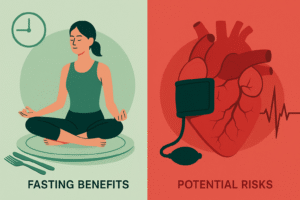Fun Fact: Did you know that in ancient Greece, fasting was considered a form of medicine and was prescribed by the legendary physician Hippocrates?
Intermittent Fasting Benefits: Weight Loss & Beyond
In today’s world of constantly changing diet trends—from pineapple cleanses to the potato-only challenge—one strategy has stood the test of time and science: intermittent fasting. It’s not just a buzzword anymore; it’s a lifestyle gaining popularity for good reason. In this blog, we’ll explore the benefits of intermittent fasting for weight loss and see whether its magic goes beyond just trimming the waistline.
So grab a glass of water (yes, that’s allowed during fasting hours!) and let’s dig into what the hype is all about.
What Is Intermittent Fasting, Really?
Let’s start with the basics. Intermittent fasting (IF) isn’t a diet in the traditional sense—it doesn’t tell you what to eat but when to eat. There are different styles of IF, but the idea is the same: cycle between periods of eating and fasting.
Common Types of Intermittent Fasting:
- Time-Restricted Eating (TRE): Eating all meals within a 4- to 12-hour window each day.
- Alternate-Day Fasting (ADF): Fasting every other day or eating no more than 500 calories on fast days.
- The 5:2 Diet: Eating normally for 5 days a week and limiting intake to about 500 calories on two non-consecutive days.
These methods can seem tough at first, but many people report they get easier with time, especially when the results start showing!
The Weight Loss Connection
Let’s face it—most people try intermittent fasting to lose weight. And yes, it works.
A 2022 study from the University of Alabama at Birmingham showed that adults who followed Time-Restricted Eating for just 14 weeks lost around 6.3 kilograms, compared to just 4 kilograms by those with more extended eating windows. Dr. Courtney Peterson, who led the study, noted that people found it easier to follow “when to eat” rules rather than counting every calorie.
In another review of 22 clinical trials, Alternate-Day Fasting and the 5:2 diet helped people with obesity lose 4–8% of their body weight in just 8–12 weeks.
So if your goal is weight loss, IF might just be your secret weapon.
Beyond the Scales: Are There Extra Health Benefits?
This is where things get interesting. Researchers are asking: does intermittent fasting offer benefits beyond just calorie reduction?
Metabolic Switching
When you fast for around 12 hours, your body runs out of glucose and starts burning fat for fuel, producing substances called ketone bodies. This switch—called metabolic switching—may:
- Enhance brain function
- Support cellular repair
- Reduce inflammation
- Improve insulin sensitivity
Dr. Mark Mattson, a neuroscientist at Johns Hopkins School of Medicine, believes humans are evolutionarily designed to thrive in this fasted state. His research in rodents shows that fasting may reduce the risk of Alzheimer’s and Parkinson’s disease.

Timing Is Everything
Ever heard of your circadian rhythm? It’s your body’s internal clock. Studies from the Salk Institute in California showed that mice who ate only during their active hours (nighttime, for mice) avoided obesity, even when fed a high-fat diet.
Interestingly, human trials suggest similar benefits. People who stopped eating before 6 p.m. had better blood sugar control than those who ate late into the night. So, aligning eating windows with your body clock might boost the benefits of fasting.
What Science Still Doesn’t Agree On
Despite exciting results, the research isn’t black and white.
For example, a 2024 study from Johns Hopkins showed no major differences in weight loss or blood sugar control between people on a 10-hour eating window and those on their regular schedules. Critics say this might be because the 10-hour window was still too long.
Krista Varady, a nutritionist at the University of Illinois, believes the benefits are mostly due to eating fewer calories, not the timing itself. But others like Dr. Peterson argue that even with equal calorie intake, fasting leads to improved insulin sensitivity and lower blood pressure.
So, who’s right? Probably both—because human bodies are complex and diverse.
Lessons from Mice (Yes, Really)
A lot of what we know comes from animal studies.
- Fasting mice showed improved memory, lower cancer risk, and better response to chemotherapy.
- Feeding them during natural hours extended their lives by up to 35%!
- However, fasting may also increase tumour development in mice with cancer gene mutations.
The bottom line? These findings are promising, but humans aren’t just big mice. We need more long-term human studies to know for sure.
Is Intermittent Fasting Safe for Everyone?
While IF has many upsides, it’s not a one-size-fits-all approach. Here are a few groups who should be cautious:
- Diabetics: Fasting may cause dangerously low blood sugar.
- Breastfeeding women: May affect milk supply.
- Children and teens: Could interfere with growth.
- Those on medications: Fasting might impact drug absorption or increase side effects.
Be sure to consult a healthcare professional before beginning any fasting plan.
So, Should You Try Intermittent Fasting?
If you’re someone who:
- Struggles with counting calories
- Eats out of boredom
- Wants a flexible eating pattern
- Likes defined rules
…then intermittent fasting could work well for you. It might not be a magic bullet, but it’s a sustainable and evidence-backed way to lose weight—and maybe, just maybe, it does more than that.
Key Takeaways
- Intermittent fasting helps with weight loss, mainly by reducing calorie intake.
- There may be additional health benefits related to metabolic switching, cellular repair, and circadian rhythm alignment.
- Scientific opinions are split on whether these effects go beyond simply eating less.
- It’s not for everyone—consult a doctor if you have underlying health conditions.
- The best fasting plan is the one you can stick to—consistency matters more than perfection.
Author’s Note
Hi there! I’m passionate about making science simple and relevant for everyday life. If you found this blog helpful, share it with someone curious about health trends—or drop a comment about your own fasting experience!
G.C., Ecosociosphere contributor.




